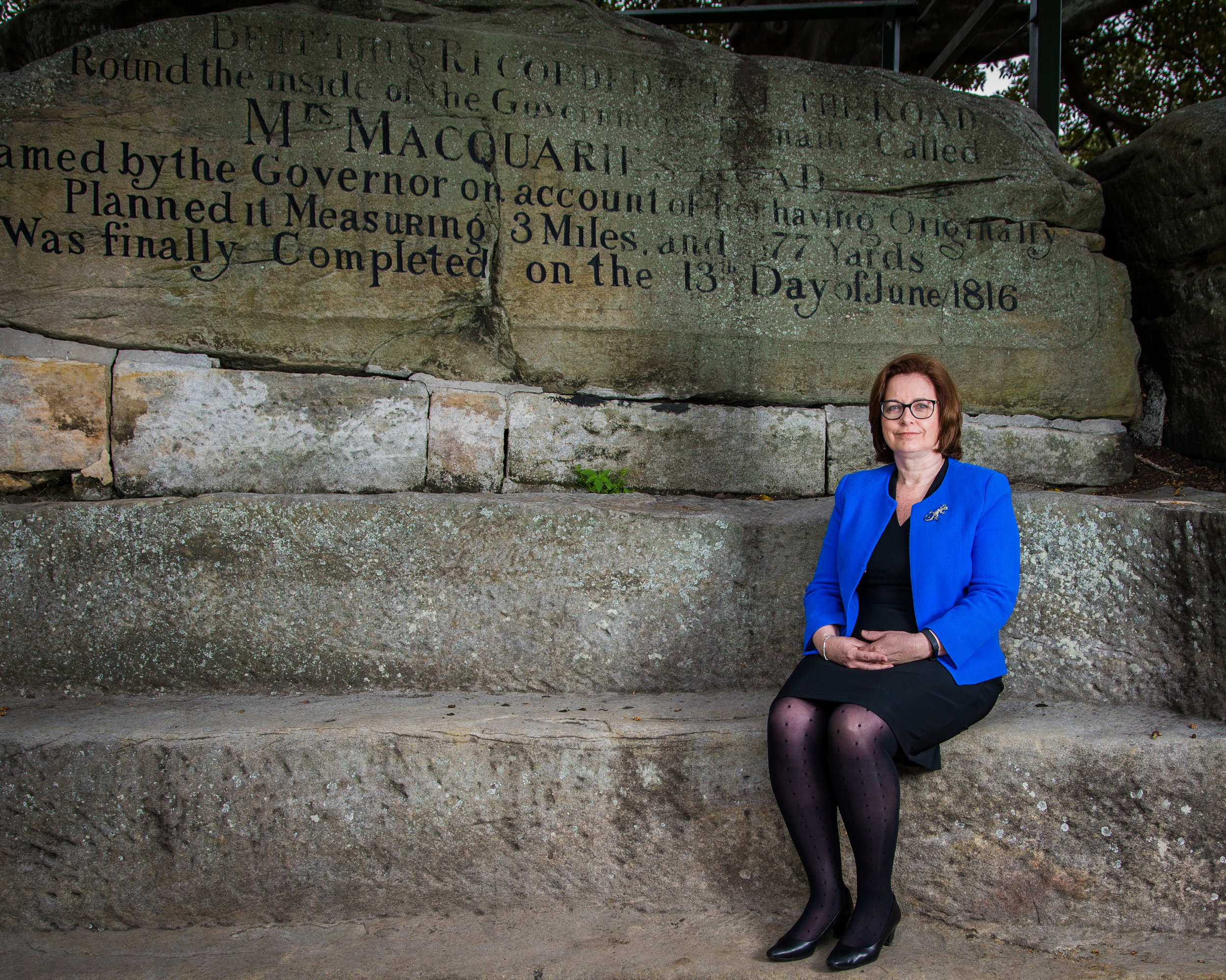Sue Gilchrist
Words by Emily Ainsworth, photography by David Field
Sue Gilchrist at Lady Macquarie’s Chair.
Reflecting on the significance of Mrs Macquarie’s Chair, Sue Gilchrist describes its restorative power, “I find that we draw strength from rock, and this is a beautiful piece of rock. However, it also has mixed historical significance, as a site of Aboriginal protest with connections to European settlement and convict history. There is so much going on, and yet despite all of that, I find it a really peaceful restorative spot. Even though you’re right there in the middle of the city, you feel like you’re amongst nature.”
Sue Gilchrist, Head of Intellectual Property Disputes for Herbert Smith Freehills (HSF) Australia, explains how her experience as former Managing Partner has provided an opportunity to reflect on what the next phase of her legal career might be. Diversity and inclusion, social justice and mental health have emerged as key themes. They were always important to Sue, but performing the role of Managing Partner gave them a “renewed emphasis.”
“It was only really as managing partner that people began articulating to me the value of role modelling and the ability to influence. Being able to influence those things that are really important to me, whilst maintaining my legal practice has formed a really rewarding phase of my career.”
This attitude reflects some of the positions Sue holds as Chair of HSF’s RAP Steering Group (Reconciliation Action Plan), member of HSF Global Pro Bono and Citizenship Council, member of the Regional Diversity and Inclusion Group for Australia and Asia, and Mental Health Champion. Sue is also actively committed to diversity and inclusion beyond HSF as board member of Legal Aid NSW and member of the executive committee of Women Lawyers NSW.
Within her role as an intellectual property litigation specialist at HSF, Sue describes how she works on a huge variety of matters dealing with science and technology, as well as law.
“We are usually dealing with things which are, by definition, innovative, and we are dealing with people who have a different and often really interesting expertise.”
“It is an area of law where there is often a lot of urgency around the court procedure that is needed to enforce the IP right. I quite like that sense of urgency – the need for the team to come together really quickly and effectively in order to do a good job for the client.”
Her work also tends to have an international aspect, and often she is doing the Australian part of a “global fight.”
“The size of the Australian market on its own won’t always necessarily justify the effort that needs to happen in the Australian jurisdiction, but most of our sophisticated international clients understand that what goes into the Australian part of the proceedings has a relevance for the greater global fight.”
Sue notes how her time as Australian Managing Partner has helped her to grow as an intellectual property litigation lawyer. She describes how she has developed a newfound appreciation for what her clients are managing within their own organisation.
“When you’re just dealing with them as the lawyer, you’re focusing exclusively on the aspect of them that’s engaging with you. Now I think more broadly, and consider what’s going on for them in their own organisation.”
When asked to consider the sustainability of ‘big law’ in the face of increasingly prevalent Artificial Intelligence (AI) and other technologies, Sue remarked that she feels “very optimistic about it.”
“To me law is at the base of how everything functions in society. As the world gets more complex, law will become even more important. That increasing complexity is only going to give us more of a reason to exist – and to exist in a world where empathy with the client’s situation will always differentiate us from AI. Being a lawyer is about problem solving. While a lot of work will be done utilising AI, lawyers will still ultimately be the ones involved in the problem solving.”
“Technology will only be a tool which a team of lawyers will use to do the actual problem solving – drawing upon years of study and experience. If this involves freeing up those brains from high volume tasks, then it should result in an increase in the quality of legal judgement.”
In the legal profession there are a number of ways in which the profession as a whole is cooperating to try and find solutions in relation to how a firm might manage the integration of AI.
“Big law firms are very well placed as they can attract the best quality law students and lawyers. Part of the challenge is how to engage those really good brains not just in doing legal work, but in considering broader questions such as how a firm might organise themselves to make the most of this sort of technology.”
Copyright Field, Doraisamy, Ainsworth and Standish 2016-2018
